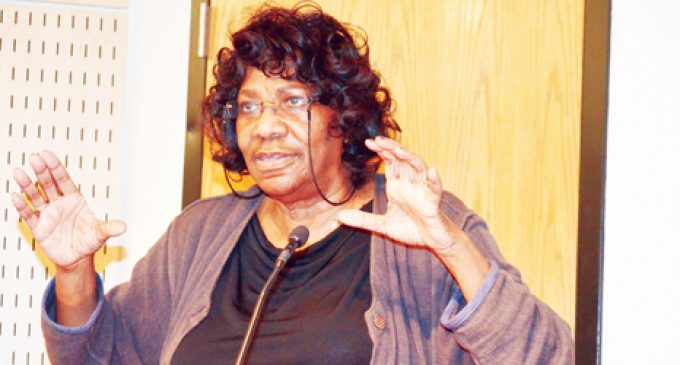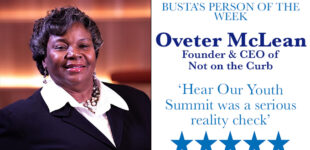Geneticist: Science doesn’t support racial distinctions

(pictured above: Dr. Georgia Dunston speaks at WSSU.)
Dr. Georgia Dunston is a well known genetics professor and scholar and founder of Howard University’s National Human Genome Center, but she told an audience at Winston-Salem State University last week that the term “genetics” is one she tries to avoid.
“The subject of genetics brings a lot of baggage, especially with underserved populations that have that negative history with how genetics has been used to manipulate them,” she explained, referencing historical iniquities like the Tuskegee syphilis experiment and eugenics programs that deceived and harmed many blacks.
For the purpose of her lecture, Dunston defined the human genome (the genes, DNA and other genetic material in DNA) as “the complete set of instructions for making and operating the human body that each of us inherits from each of our parents at the moment we begin the cycle of life as a single cell.”
There is legitimate human genome research involving the study and prevention of diseases, but Dunston says the genome’s secrets go far beyond epidemiology.
“What I want to talk about today is the other side of the story, if you will,” she said. “The rest of the human genome theory is about inheritance and identification.”
Although race and ethnicity are defining components of American culture and many others around the globe, scientifically speaking, there is precious little basis for racial distinctions, Dunston said.
“Seeing ourselves as different races is a belief system, and we operate and live based on what we believe to be real,” she declared. [pullquote]“… 99.9 percent of our total sequence is the same, regardless of where you come from on this globe. If 99.9 percent of your inheritance is the same, what is your basis for making distinctions between you? You have based distinctions on less than one tenth of one percent of your inheritance.”[/pullquote]
Dunston implored the audience to rethink the way they view race.
“I want you to see there is a relationship between what we see and what we believe is, and the empowering thing is that we can choose what we believe,” she remarked. “The genome challenge is that you are so much more than what you can see. It’s much more difficult to change your genome than it is to change your mind.”
Much of Dunston’s talk was directed to students, who she says are the keepers of the future.
“This message is for you because you are the problem solvers,” she intoned. “Every problem is a lack of knowledge, and the genome is a knowledge system. It’s knowledge about the human body and how it operates.”
Regardless of the origins of race, the correlation between people of color and a disparate amount of disease is undeniable, even here in Forsyth County, which leads the five major counties in this state in the incidence of most diseases, said Dr. Sylvia Flack, director of the Center of Excellence for the Elimination of Health Disparities, who took part in a panel discussion with Dunston and Rev. Dr. Dennis Leach Sr., pastor of Morning Star Missionary Baptist Church, immediately following Dunston’s lecture.
“Racial and ethnic groups in this county have more disease than any other group,” Flack reveled. “They have more diabetes, more cancer, more obesity and overweight, and you know about the infant mortality rate, you know it’s high.”
If America fails to address them, Flack said health disparities will ultimately be its downfall.
“We are really not emphasizing health, number one, as the most (important) impact of keeping our country going. I can see and others can see how we’re deteriorating because of the health of this country,” Flack said. “We need to be educated –not just healthcare providers, but everyone, regarding health.”
The panel also explored the relationship between religion and genetics. Many believe the two ideals are in direct opposition to each other, but Dunston contends that science is proof a higher power exists, as there are many connections between the human genome, which she regards as “the quintessential gift of life,” and the universe.
“I really think the human genome model is a model of eternal life,” she said. “…You cannot study the genome and look at the information on this sequence and not know that there is a code that unfolds to give us what we see.”
Leach quoted several texts from the Bible that he says uphold Dunston’s theories about the connections between faith and science.
“It takes both faith and science to move us one step closer to the reality of God,” he said. “We are here to talk about the human genome, but we are also here to talk about the God … who calls us into community as neighbors.”
Leach said racial divisions are derived from humanity’s limited view of the world, and have no place in the work that he believes God is calling Christians to do.
“God spoke to me that I had to value, validate and affirm, and that’s all I can do,” Leach said. “…As a ministry leader, that has to be something that we promote within the congregation, but also within the community. If we are authentically following Jesus, we care, and we show that by getting out and allowing people to touch our lives and to be touched by their lives.”

















